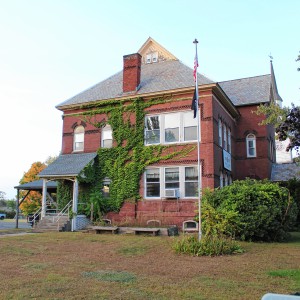Montague officials consider pursuing Climate Leader title

Montague Town Hall. Staff File Photo/Paul Franz
| Published: 07-22-2025 5:42 PM |
MONTAGUE — Two months after Ashfield’s designation as a Climate Leader Community, Montague is considering pursuing the same distinction, which could make the town eligible for up to $1 million in grants to support clean energy and decarbonization efforts at town buildings.
The idea of becoming a Climate Leader Community was brought to the Selectboard by the Energy Committee on Monday with help from Chris Mason, the western Massachusetts coordinator for the Green Communities program under the state Department of Energy Resources.
Energy Committee Co-Chair Tim Van Egmond said the town has already received $553,700 in Green Communities grants as part of its membership in the program since 2011. If the town becomes a Climate Leader Community, it would be a “huge step up” in terms of grant opportunities for solar and electric vehicle upgrades, among other options.
The Climate Leader designation builds on the Green Communities program, which encourages communities to reduce their municipal energy usage. Since the Green Communities program was first created in 2010, 297 Massachusetts cities and towns have earned the designation, including Montague in 2011, prompting state officials to create the Climate Leader program.
Montague would become the latest town in Franklin County to become a Climate Leader, joining Ashfield, which received its designation in May. Warwick is also pursuing the distinction following Annual Town Meeting votes in May.
To become a Climate Leader, municipalities must commit to transition from on-site fossil fuel use in municipal buildings and vehicle fleets by 2050, enact a Zero-Emission-Vehicle-First policy and adopt the Specialized Stretch Energy Code.
According to documents shared by the Energy Committee during Monday’s meeting, this specialized energy code only applies to new residential, town and commercial construction, not additions and renovations. The document explains how between 2020 and 2024, the town has added two to six new, single-family homes and two to 10 commercial buildings annually, “so the code will apply to very few buildings.”
“The basic strategy the state is following is, in a way, electrify everything,” Mason said about the state’s plans to meet its net-zero carbon emissions goal by 2050, which includes electrifying buildings and vehicles.
Article continues after...
Yesterday's Most Read Articles
 Keeping Score with Chip Ainsworth: UMass hockey girds for new campaign
Keeping Score with Chip Ainsworth: UMass hockey girds for new campaign
 My Turn: A rocky road ahead for Stone Farm Lane proposal
My Turn: A rocky road ahead for Stone Farm Lane proposal
 ‘There’s always people you know here’: Bernardston’s Scarecrow in the Park brings community together
‘There’s always people you know here’: Bernardston’s Scarecrow in the Park brings community together
 Speaking of Nature: A surprise in my maple tree: Porcupines just want to find something tasty to eat and be left alone
Speaking of Nature: A surprise in my maple tree: Porcupines just want to find something tasty to eat and be left alone
 Greg Franceschi: Support bike lanes and walking paths in South Deerfield
Greg Franceschi: Support bike lanes and walking paths in South Deerfield
 Lowest bid comes in at less than $6M for Deerfield’s 1888 Building project
Lowest bid comes in at less than $6M for Deerfield’s 1888 Building project
Before becoming a Climate Leader, a municipality must meet five criteria, two of which Montague already does as a Green Community in good standing with an active Energy Committee.
The three remaining pieces include adopting two warrant articles during a Town Meeting — a non-binding resolution to end the on-site burning of fossil fuels in municipal buildings by 2050; adopting a Specialized Stretch Energy Code for all future building construction; and adopting a Zero-Emission-Vehicle-First policy that gradually replaces vehicles that are powered by fossil fuels with electric or zero-emission fleets.
Mason explained that once a town becomes a Climate Leader, the town can apply for a technical assistance grant for up to $150,000 that can help with capital planning, and grants of up to $1 million for various decarbonization projects. Energy Committee Co-Chair Sally Pick said the sooner the town can become a Climate Leader, the more grants will be available.
Although this $150,000 is available to the town after it is named a Climate Leader, there are already initiatives underway to decarbonize municipal infrastructure. Assistant Town Administrator Chris Nolan-Zeller explained Tuesday that the town has a $27,000 Energy Efficiency and Conservation Block Grant to plan next steps for decarbonization at nine municipal buildings.
The Selectboard on Monday approved having Nolan-Zeller apply for technical assistance for a decarbonization study of three additional buildings. With these 12 buildings being studied as well as the town’s vehicle fleet, and the Gill-Montague Senior Center being studied through a $50,000 earmark, the town can develop the required decarbonization roadmaps needed to become a Climate Leader.
Becoming a Climate Leader would help the town maintain its “good history” in becoming a climate-friendly town, Nolan-Zeller said. Pick noted Tuesday that the Climate Leader designation could lead to reduced energy expenses for the town, as well as state and federal incentives for electric-powered homes and municipal buildings.
Moving forward, Pick said the Energy Committee plans to host information sessions about the Climate Leader designation, and what impact it would have on the town, residents and developers.
Erin-Leigh Hoffman can be reached at ehoffman@recorder.com or 413-930-4231.






 South County Notebook: Aug 17, 2025
South County Notebook: Aug 17, 2025 Mohawk Trail students to see new staff, new codes of conduct upon Aug. 27 return to school
Mohawk Trail students to see new staff, new codes of conduct upon Aug. 27 return to school Grand opening of Buckland-Shelburne Elementary School playground set for Aug. 26
Grand opening of Buckland-Shelburne Elementary School playground set for Aug. 26 Bear-y unwelcome: Why MassWildlife says it’s time to ‘break up’ with bird feeders
Bear-y unwelcome: Why MassWildlife says it’s time to ‘break up’ with bird feeders
